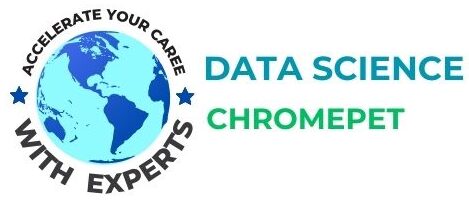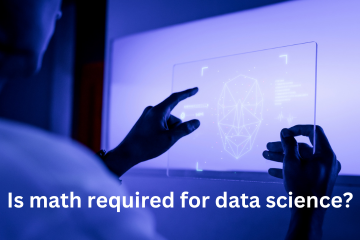Table of Contents
Yes, math is a fundamental component of data science. It is essential for understanding and applying various concepts, techniques, and algorithms in data analysis, statistics, and machine learning. Here are some key areas of mathematics that are highly relevant to data science:
Want to learn more about Dara scientist expert? Enroll in this Best Data Science in Bangalore to do so.
Statistics:
A solid understanding of statistical concepts is crucial for data scientists. Topics such as probability theory, hypothesis testing, regression analysis, and sampling methods are used to analyze and interpret data, make inferences, and draw meaningful conclusions.
Linear Algebra: Linear algebra is heavily used in data science for tasks like matrix operations, dimensionality reduction, and solving systems of equations. Techniques such as principal component analysis (PCA) and singular value decomposition (SVD) rely on linear algebra principles.
Also, check this Best Data Science course in Kottayam to start a career in Best Data Science in Chennai
Calculus:
Calculus is employed in various aspects of data science. Differential calculus is used for optimization algorithms, such as gradient descent, which is a key component of many machine learning algorithms. Integral calculus is used in probability density functions and cumulative distribution functions for probability calculations.
Probability Theory: Probability theory forms the foundation for statistical inference and uncertainty modeling in data science. Understanding concepts such as random variables, probability distributions, and conditional probability is crucial for building probabilistic models and making informed decisions based on data.
Optimization:
Optimization methods are widely used in machine learning algorithms and other data science tasks. Knowledge of optimization techniques, such as convex optimization and numerical optimization, helps in model training, parameter tuning, and finding optimal solutions.
Discrete Mathematics: Discrete mathematics, including topics like combinatorics, graph theory, and logic, plays a role in various areas of data science. It is used in tasks such as network analysis, recommendation systems, and data visualization.
While mathematics is a core component of data science, it’s worth noting that the level of mathematical knowledge required may vary depending on the specific data science tasks, projects, and domains. Different roles within data science may have varying levels of emphasis on mathematics. Nonetheless, a solid foundation in mathematical concepts is crucial for a thorough understanding and effective application of data science techniques and algorithms.
Machine Learning Algorithms:
Many machine learning algorithms, such as linear regression, logistic regression, support vector machines, decision trees, and neural networks, rely on mathematical principles. Understanding the underlying mathematical concepts helps in comprehending how these algorithms work, selecting appropriate models, and fine-tuning their parameters.
Learn the core concepts of Data Science Course video on Youtube:
Feature Engineering:
Feature engineering is a crucial step in data preprocessing, where mathematical techniques can be applied to transform and extract useful features from raw data. This involves techniques like scaling, normalization, polynomial expansion, and creating interaction terms, which require mathematical understanding.
Model Evaluation and Validation: Assessing the performance of machine learning models involves mathematical metrics such as accuracy, precision, recall, F1 score, and area under the ROC curve. Understanding these metrics helps in evaluating model quality and selecting the best model for a given task.
Don’t delay your career growth, kickstart your career by enrolling in this Best Data Science in Pune with 360DigiTMG Data Science course.
Time Series Analysis:
Time series data, which is prevalent in many domains, requires specialized mathematical techniques for analysis. Concepts such as autocorrelation, stationarity, Fourier analysis, and ARIMA models are used to model and forecast time-dependent data.
Experimental Design:
In experimental settings, data scientists need to design experiments to gather data and draw valid conclusions. Principles from statistics, such as randomization, factorial designs, and sampling methods, are essential for experimental design and statistical inference.
Bayesian Inference: Bayesian statistics is a powerful approach in data science that allows incorporating prior knowledge into the modeling process. Bayesian methods rely on probability theory, conditional probability, and Bayes’ theorem to update beliefs and make probabilistic inferences from data.
Become a Data science expert with a single program. Go through 360DigiTMG’s in Best Data Science in Hyderabad. Enroll today!
Optimization Techniques:
Optimization is a core component of many data science tasks, including parameter optimization, model selection, and hyperparameter tuning. Mathematical optimization techniques, such as gradient descent, constrained optimization, and global optimization, are essential for finding optimal solutions.
Data Visualization:
Visualizing data effectively involves understanding principles of data representation, dimensionality reduction, and graphical perception. Concepts from mathematics, such as coordinate systems, scaling, and interpolation, contribute to creating meaningful and visually appealing visualizations.
While math is integral to data science, it’s important to note that data scientists typically leverage libraries and frameworks that abstract away much of the mathematical complexity. Tools like Python’s NumPy, SciPy, and scikit-learn provide pre-built functions and modules for mathematical operations, statistics, and machine learning, allowing data scientists to focus on applying these techniques rather than implementing them from scratch.
Nonetheless, a solid mathematical foundation enables data scientists to better understand, interpret, and innovate within the field of data science.




